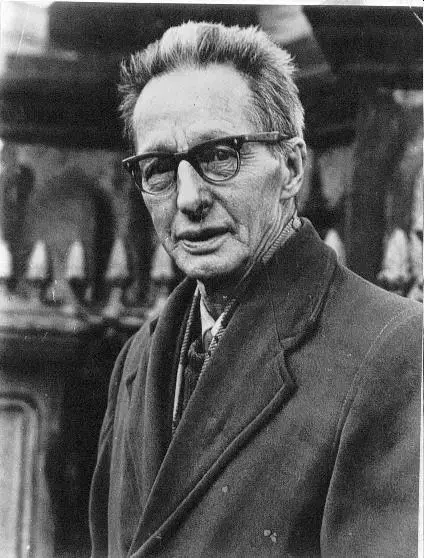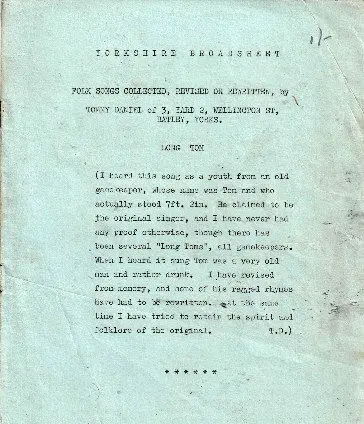
Tommy Daniel. Photo: Telegraph & Argus.
Compiled and collated with illustrative notes by Mick Haywood

Tommy Daniel. Photo: Telegraph & Argus.
Includes text and notes from original manuscripts,
‘A Yorkshire Broadsheet’, Tykes News
and Raggers Broadsheets.
Many years have passed, for one reason or another, since this publication was initially conceived, by a group of friends and me, in the early in the early 1970s. Sad to say, there are only a couple of us still around to see its fruition.
The introduction, songs and text were compiled, the tunes drawn, and they were handed over ‘en masse’ to the Leeds based ‘Celtic Music’ for publication in 1973. Unfortunately, when moving house Dave Bulmer lost all the hand written tune manuscripts. For many years afterwards, I always greeted him with “Have you found my bloody tunes yet!“ But he never did. Relatively recently I found a copy of the tunes, in a old folder at the back of my attic. I purchased myself some music notation software, and here it is, finally completed over fifty years after the initial publication date.
Mick Haywood, Whitby , October 2024.
The Editor would like to express his appreciation and gratitude for the kind assistance rendered by the following:
Vic Ellis and Keith Pearson for drawing the original tunes from manuscripts, tape recordings and from the memory and singing of Mick Haywood.
John Browel.
Kathy and Dorothy Fawthrop.
Ronnie Wharton.
A.E. Green, Institute of Dialect and Folk Life Studies, University of Leeds.
Telegraph and Argus, Bradford for frontispiece photograph.
Thomas Sykes Daniel was born at Lowtown, Pudsey in 1889. His father had been a farmer, although at the time Tom was born he was employed as a gardener. Old Mr. Daniel sang regularly in the church choir where Tom's uncle was the organist.
The two brothers sang together in a Minstrel Show 1897-1898. Both his father and uncle kept manuscript copies of their songs. Tom had access to these until they were destroyed in a fire at his house in 1935. It was from these manuscripts and the singing of the two brothers he acquired some of his songs, notably, “Old Jim Slack”.
Tom left school in 1904 and went to work in a woollen mill, sweeping up and doing odd jobs. It was during these early years he picked up the song “Poverty Knock”. From sweeping up he progressed to office work rather than to work in the mill, and from 1910 to the outbreak of the War he attended classes in textile chemistry at Leeds Technical College.
In 1914 the Evening News, Trinity Street, Leeds, took him on the staff as a junior reporter. He stayed with them until 1920 when he went back into the woollen trade, working in wool carbonising at Jarmains in Huddersfield.
During the 1920s he worked casually, during the summer seasons often going to Morecambe to play in a Rag Time Band. The winter months were spent writing and working off and on in the woollen trade. Tom worked at Jarmains at Kirkheaton, Huddersfield in the 1930s, he then moved to another mill in Huddersfield, but was only there a short while before being laid off.
He attended the “unemployed classes” at Leeds University where he studied Geology, which had application to his work in carbonising, and also classes in English Literature.
In 1935 Tom and his wife Sally moved to Batley, and he went to work at Forsters Mill, Liversedge as an overlooker.
In 1940 they moved to Drax, Tom having got a job in the NAAFI store at Barlow, he resigned from this job after a couple of years as it involved a twelve mile all-weather cycle ride, which he claimed was doing his health no good.
Sally returned to Batley and Tom went to Immingham to work for the Royal Navy in their victualing department. He stayed there until the end of the war, whereupon he moved back to Batley and a job at Forsters Mill until he retired in 1954.
After his retirement he had an assortment of jobs, he sold newspapers in Heckmondwike market place, sold tips at Doncaster, Pontefract and Catterick race courses, dealt in stamps and did the odd song and dance routine in local working mens clubs.
He worked casually on Batley market helping out on the “pot stall”; he was also the pools collector for the stallholders and local shopkeepers.
Tom took up painting, becoming very enthusiastic attending evening classes at Batley College of Art. He painted both in oils and watercolours, landscapes, portraits, and the odd abstract, his speciality being racecourse scenes from memory. These paintings proved very popular with sporting landlords and several were hung in taprooms of public houses in and around Bradford.
Sally died in 1966.
Tommy encountered the “folk movement” through the folk revival in the early 1960s and began frequenting folk clubs and writing new songs.
With much encouragement from friends he published "A YORKSHIRE BROADSHEET, Folk songs collected, revised or rewritten, by Tommy Daniel of 3, Yard 2, Wellington Street, Batley, Yorks."
He hawked copies of the eight-paged broadsheet round the local folk clubs selling them at a shilling each. The demand for them was so great that it occasioned a reprint. He soon became a great favourite with folk club audiences and was an enormous success when he appeared at the Leeds Folk Festival in 1967.
Tommy accompanied most of his singing on an old small banjo tuned like a ukulele, and with the 5th string removed, the instrument invariably being tuned GCEA or AD F Sharp B.
Having lost the middle two fingers of his right hand in a mill accident he tended to accompany all his songs with a mechanical strumming rhythm, although when pressed to sing unaccompanied, “baht” as he was wont to say, he sang very well.
He had much difficulty tuning his instruments since they were always in a very sad state of repair. So prior to going “slumming” he would tune his instrument up to the piano at home, place the instrument upright in a green canvass bag and gather the material up about the neck and with great ceremony proceed to wind about four feet of black tape around the banjos throat, knotting the end. On arrival at a club or concert he would then with great deliberation proceed to unwind the tape, remove the instrument, sound a chord, then straightway pass it to someone to retune as it had gone off during transit. When he received the banjo back it was invariably further out of tune than before.
I first had the pleasure of meeting Tom when he came to Leeds peddling his songs and broadsheet around the city's folk clubs. I met him subsequently on infrequent visits to the Station Hotel, Dewsbury, where he could be found most Tuesday evenings sat around the fire of an upstairs room, chatting and swapping songs with a close circle of friends.
On moving to Batley I was honoured to know him as a friend.
Early in 1968, together with a few others we founded Batley Raggers Folk Club. The name “Raggers” being derived from the colloquial term used for the workers of the “rag hoils”, the local rag mills where woollen waste and other worsted goods are worked back into the usable commodities mungo and shoddy.
From the folk club's birth grew the Raggers Broadsheets. These pamphlets basically intended for advertising, served in the main as as a vehicle for Tommy’s songs, recollections and reminiscences. Besides the broadsheets, Tom wrote articles for Tykes News, and The Dalesman. His recollections of Carnivals, Sports Days and Fancy Dress Parades of the pre-war years made fascinating reading. Comic processional bands with names like The Bletherheads, Leeds Royal Tramps and The Hunslet Nannygoat Lancers couldn't fail to fire the imagination.
Tommy lived and worked at No 2, Yard 3, Wellington Street, Batley, a one-up, one-down stone built cottage in a terrace of six. Only one other house was occupied, all the other occupants having been placed in new council house accommodation due to slum clearance orders. The upstairs room was only used for storage; he lived and slept downstairs. This room held his bed, sideboard, dining table, rocking chair, piano, sink and a small gas ring for cooking purposes. It was here he could always be found happy amidst his manuscripts, books, part-built weather-houses, easel, paints, brushes and printing materials. The walls were hung with an assortment of paintings, instruments and diplomas. There was always a fire in the grate and a cat and kitten on the hearth.
He was right at the very heart of the town, the market and shops being close at hand. Someone was always dropping in for a chat or to listen to his latest song. It took only a couple of minutes to nip round the corner to “The Wilton” where conversation seemed so much easier and freer in the taproom with a pint of beer to hand.
Listening to anecdotes from his life was as great a pleasure as hearing him sing. He would reminisce for hours on “The Blood Tub” (Victorian melodrama), and the Old Music Hall and Variety tradition.
Eventually his house had to be pulled down. He was moved into a centrally heated council bungalow at Staincliffe, an eightpenny bus ride out of town, on January 1st 1970.
Uprooted, thrust into a new neighbourhood, and partially confined through an operation he had undergone in 1969, Tommy was no longer able to be out and about as he always had been. Severed from his natural environment, his spirit faded, and his recovery was retarded. Visitors were few.
Tommy died on April 20th 1970 aged eighty-one. A memorial concert was held on Friday 17th July at Batley Working Men's Club. All of the West Riding's leading folk performers offered their services and, on the evening, well over two hundred folk enthusiasts turned out to show the respect and high esteem held for this popular Batley character.
Mick Haywood, Batley, 1973

Front page of Tommy Daniel's original
YORKSHIRE BROADSHEET
The songs numbered 1 to 5 on the following pages were first published by Tommy on a homemade broadsheet which he hawked round the folk clubs selling them for a shilling each.
He titled it:
A YORKSHIRE BROADSHEET
Folk songs collected, revised or rewritten, by
Tommy Daniel of 3, Yard 2,
Wellington Street, Batley, Yorks.
It is very debatable whether Tommy collected any of the songs published in the broadsheet. It was commonly thought by those who knew him well, at the time, that most of them were all self penned.